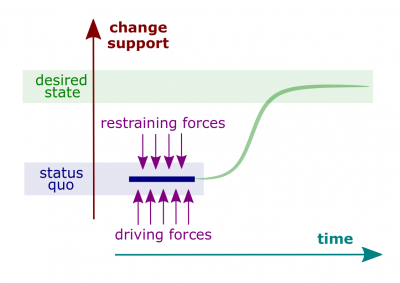Difference between revisions of "Change-support analysis"
(Created page with "400px|thumb|right|[[Status quo]]Change support analysis (hereinafter, the ''Analysis'') is an evaluation of the stakeholder support of the and, vi...") |
(→Related coursework) |
||
| (2 intermediate revisions by the same user not shown) | |||
| Line 1: | Line 1: | ||
| − | [[File:Status-quo.png|400px|thumb|right|[[ | + | [[File:Status-quo.png|400px|thumb|right|[[Change-support analysis]]]][[Change-support analysis]] (while being alternatively written, [[change support analysis]]; hereinafter, the ''Analysis'') is an evaluation of the stakeholder support of the and, vice versa, the resistance to this [[proposed change|change]]. |
==Key concepts== | ==Key concepts== | ||
| Line 6: | Line 6: | ||
*[[Driving force]]. A force that directs behavior away from status quo ([[Kurt Lewin]]). | *[[Driving force]]. A force that directs behavior away from status quo ([[Kurt Lewin]]). | ||
| − | ==Related | + | ==Related lectures== |
*[[Project Management Quarter]]. | *[[Project Management Quarter]]. | ||
[[Category: Septem Artes Administrativi]][[Category: Articles]] | [[Category: Septem Artes Administrativi]][[Category: Articles]] | ||
Latest revision as of 12:41, 4 January 2019
Change-support analysis (while being alternatively written, change support analysis; hereinafter, the Analysis) is an evaluation of the stakeholder support of the and, vice versa, the resistance to this change.
Key concepts
- Status quo. A Latin phrase meaning the existing state of affairs.
- Restraining force. A force that hinders movement from the existing equilibrium (Kurt Lewin).
- Driving force. A force that directs behavior away from status quo (Kurt Lewin).
